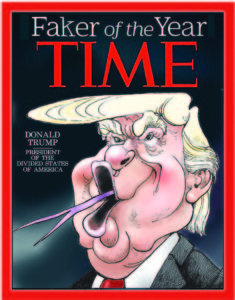Can American Democracy Survive Trump’s Reign of Lies?

My mother was a fan of Simon and Garfunkel, and I grew up hearing a lot of their music. I came to appreciate the folky duo as well.
One of my favorite songs by the duo is “The Boxer.” I’ve interpreted the tune as mostly a rumination on the loneliness and alienation emanating from the cold and unforgiving streets of New York City, but there’s one line that, especially in light of our current political situation, seems to say something deeper. It’s a line that has been coming back to me a lot these days:
All lies and jests!
Still a man hears what he wants to hear and disregards the rest.
I often think of this line when I scan news headlines. It came to me recently as I read a story in Politico about a reporter’s visit to Johnstown, Pennsylvania, a city not far from where I grew up. The reporter talked to a number of people who had voted for Donald Trump in an effort to determine if any of them were disillusioned in light of Trump’s glaring incompetence.
The reporter quickly learned that these people still love Trump. They think he’s doing a great job, and they’re convinced that any problems he may be having can be laid at the feet of the media, which is laboring to make him look bad. (As if he needed any help!)
I was struck by the fact that many of these people simply have no idea what’s going on. One man complained about how often President Barack Obama had played golf. When the reporter told him that Trump plays even more frequently, the fellow was momentarily flummoxed but quickly rebounded to say that’s all right because Trump works harder than any other president whereas Obama slept until noon each day.
Neo-Nazis are marching in the streets of major cities. Anti-vaccination cranks have made diseases like measles and whooping cough a real threat again. Around the country, groups of people are meeting to debunk the “conspiracy” that the Earth is round. People are denying climate change, even as glaciers continue to melt. A pedophile ran for US Senate in Alabama and nearly won.
Has the country lost its collective mind?
 One of the most frustrating—and sad—things about modern life is that we’ve never had easier access to information, yet many people choose to remain ignorant. The rise of the internet has taught us that wider access to information alone doesn’t change things. After all, the same internet that can turn you on to Plutarch, Neil deGrasse Tyson, and Percy Bysshe Shelley can lead you down a rabbit hole created by kooks who believe the moon landing was a hoax.
One of the most frustrating—and sad—things about modern life is that we’ve never had easier access to information, yet many people choose to remain ignorant. The rise of the internet has taught us that wider access to information alone doesn’t change things. After all, the same internet that can turn you on to Plutarch, Neil deGrasse Tyson, and Percy Bysshe Shelley can lead you down a rabbit hole created by kooks who believe the moon landing was a hoax.
Humanists, of course, are not immune to this. We’re all susceptible to confirmation bias, but I have to say, based on what I’ve been reading about Trump supporters since the election, no one can touch them when it comes to being delusional. They have chosen a state of willful ignorance over living in the reality-based community.
The president routinely sticks his foot in his mouth and behaves like a petulant twelve-year-old on Twitter. Evidence continues to mount of his administration’s unsavory ties to the Russians. Members of his own party have questioned his sanity. He relentlessly pursues policies that seemed designed to shaft his working-class base.
And none of this matters to the true believers.
It’s alarming that this mindset affects public policy—and believe me, it does. Trump’s administration is riddled with people who dismiss climate change, reject the health benefits of birth control, and cling to the idea that tax cuts for the rich will trickle down to boost the fortunes of the poor, among other things.
What’s more horrifying about Trump’s “post-truth” age of politics is that it has set a new low in political benchmarks. Many political analysts believe our nation will be left grappling with the repercussions of “Trumpism” long after he has left office. Sadly, they are probably right.
The American people have never considered politicians to be especially truthful, but Trump has taken us into uncharted waters here. In the past, a political leader who insisted that the sky is chartreuse when anyone could look outside and see that it’s blue would have been considered deranged or a liar. Trump says things like this all of the time—and his followers simply aren’t fazed. They’re likely to crane their necks and say they can see the chartreuse sky as well.
Furthermore, Trump lies when he doesn’t have to. Other politicians tell whoppers to get out of a tight situation or to further a political agenda. Not Trump. He lies when it simply makes no sense to lie, when the lie is easily debunked.
Again, Trump’s fans just yawn.
If this were a fringe group, we could perhaps yawn back. But 63 million Americans voted to make this man the leader of the free world. So far, there is precious little evidence that they’re experiencing buyer’s remorse in any significant numbers.
Those of us who’ve monitored religious right groups are accustomed to this attitude. We’re used to dealing with people who assert, against all available evidence, that the United States was officially founded to be a “Christian nation” and that the Earth is only 6,000 years old. That sort of thing was to be expected from fundamentalist religious zealots who long ago decided to elevate belief over fact.
It now seems to be the preferred method of thinking for millions of Americans who aren’t necessarily connected to the religious right. For them, opinions are just as good as facts, and beliefs don’t have to be reevaluated in light of new information.
Can a democracy exist when millions of people have adopted the attitude that inconvenient truths need not be heeded and, in fact, may not be truths at all? Disturbingly, we are likely on the verge of finding out.
